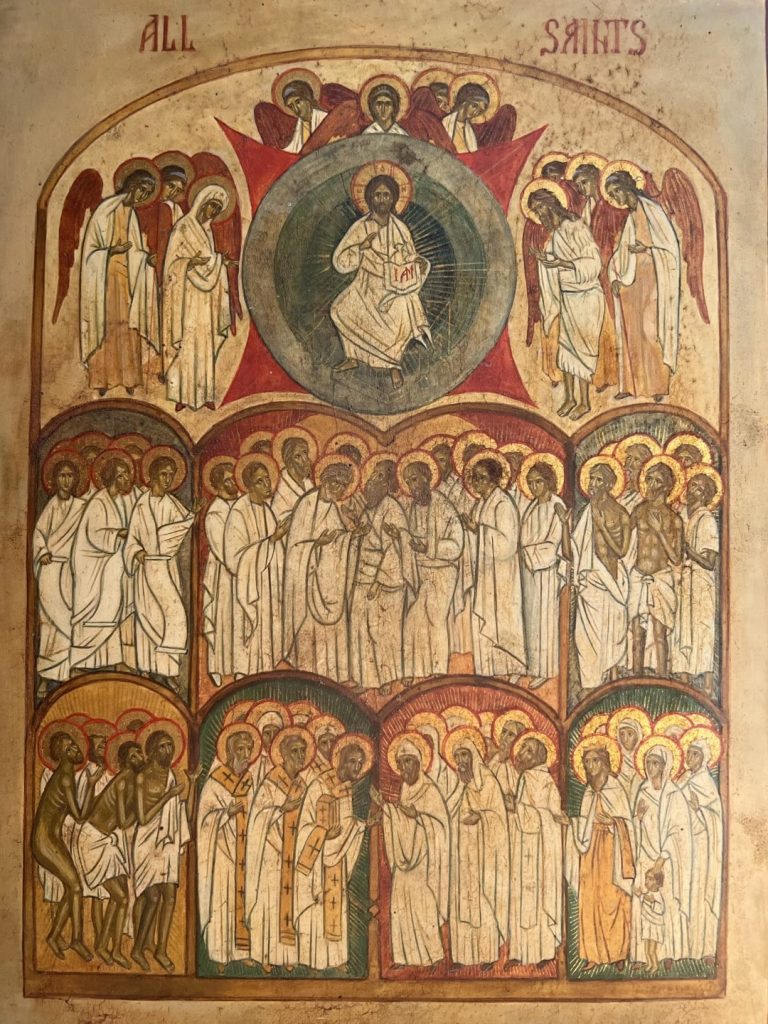The Rich Young Man Meets with Christ
In our quiet expectation of the great feast of Christmas, ‘the metropolitan of feasts’, the Gospel readings of this period revolve around the burning question: ‘What shall I do to inherit eternal life?’
Man was formed for eternity and his spirit urgently demands it. Even centuries of a blissful life cannot satisfy his thirst for things eternal, immutable and good. For God not only ‘created man for incorruption, and made him to be an image of His own eternity’,1Wis. 2:23. but furthermore, He ‘left naught undone until He lifted him up to heaven’2 The Anaphora of the Divine Liturgy. to lay open new ‘paths of life’3Ps. 16:11. to the sons of men.
The question of how someone may inherit eternity is the only thing that has importance in his transitory existence. The faithful Christian asks this question with the desire to prepare his heart to receive the eternal Life which comes and takes on flesh for the salvation of the world. With this question, he presents himself before God and His ministers.
No one comes into the Church just to become a good person, or to acquire spotless behaviour, or to fulfil his religious duty. We approach the Church to sow the seed of immortality and to receive the first fruits of eternal life.
Eternal life is the energy of God Himself, with which man has to have continual contact, already from this present life. God is the only one who is good and eternal, yet whoever partakes of His energy becomes also good and eternal by grace.
Many thronged Christ, yet not all had a good intention. Some mocked Him, some tried to trap Him, others sought healing from the illnesses that were tormenting them. The young man of today’s Gospel reading approached Christ with a genuine disposition, desiring eternal life. This is why in the Gospel according to Saint Mark, the Evangelist says: ‘Then Jesus beholding him loved him.’4Mark 10:21.
The young man obviously sensed that the teaching of Christ was paradoxical. Perhaps he even considered Him to be a prophet as he called him, ‘Good teacher.’ However, he was not able to recognise Him as the expected Saviour.
Christ condescended to answer the young man according to his ‘understanding’, that is according to his own limited perception, so as to raise him gradually to the level of the divine truth. It was as if He were to say to him: ‘If thou dost not consider me to be God, Why callest thou me good? None is good, save one, that is, God.’
Thenceforth the Lord reveals through His words to the young ruler, both His divinity and also the falsity and double-mindedness in the life of this young man. He answered his question by explaining that the path which leads to eternal life is the keeping of the commandments.
The Lord is secretly hidden within His word. Thus, whoever receives this word and begins to apply it, discovers the divinity of the Person who gave the commandments and tastes of His grace.
God does not force anyone. He offers the absolute truth in a hypothetical word, so as to not impose it, but to leave man free to show his good predisposition, make his experiment and ascertain the truth of the divine word.
The young leader knew the law and kept its precepts. However, he sought something new, something deeper, something which would be able to lead him into the fulness of life and truth. The old law had been given to restrict sin. This young man felt the insufficiency of the law, having discovered that it could not lead man to spiritual perfection. This was also the reason that Israel expected the Messiah, Who would reveal to them ‘all truth’.
Once again, the Lord condescended to this man’s level and enumerated the commandments of the law of Moses. The young man was surprised and discountenanced at Christ’s answer, because he had kept these commandments spotlessly, but he had not found the ‘abundance of life’ that he sought. He could not apprehend that although he had kept the commandments, he had kept them in the spirit of the law and not in the spirit of the grace of Christ: ‘For the law was given by Moses, but grace and truth came by Jesus Christ.’5John 1:17.
Saint Sophrony used this passage about the rich young man, to explain the need to make a transition from the ethical to the ontological level of the spiritual life. He commented that: ‘From the ethical perspective, the young man seemed to be on a high level. But there is another level that is higher, which refers beyond to the divine sphere of uncreated Being without beginning’.6Οἰκοδομώντας τὸν ναὸ τοῦ Θεοῦ μέσα μας καὶ στοὺς ἀδελφούς μας, vol. 3, p. 329.
It is impossible for anyone to find the fulness of life concealed within the commandments through their legal, external observance without the participation of the deep heart. Furthermore, the young man had accepted the delusion that he was blameless before the law and righteous, and that is why he asked the Lord in perplexity: ‘In what, then, do I lack?’ He disregarded the fact that the righteousness of man is like a ‘filthy rag’7Isa. 64:6. before God. He did not know that the greatest commandment is that man should recognise that he is a useless servant, even when he carries out the commandments his has been given unto the end, for he has only fulfilled his duty.8See Luke 17:10.
All the teaching of Christ reveals how someone may become perfect, ‘even as our Father in heaven is perfect.’9Matt. 5:48. Thus the Lord showed even this young man what he was lacking, so he could reach the enjoined perfection:
‘Yet lackest thou one thing: sell all that thou hast, and distribute unto the poor, and thou shalt have treasure in heaven: and come, follow me.’ The purpose of these divine commandments in general is to free the heart, to break the mind away from the attraction of created goods, to lead ‘the soul out of the prison (of the passions)’,10See Ps. 142:7. so that man can love God with all his being.
Clearly, the young ruler was bound by the passion of covetousness. Christ gave him the exact commandment, which would liberate his heart from this passion, so that he may freely turn to God. Knowing ‘the heart of all men’,11See 1 Kings 8:39. the Lord foresees what each person needs for his healing. For Abraham who ‘loved Isaac’, the son of promise, and thus his heart was divided, God gave the commandment to sacrifice him.12Gen. 22. 2 And when the patriarch preferred the love of God over the love of his child, God gave him back Isaac and all the fulness of divine love. Then Abraham saw ‘the day of the Lord and was glad’.13Cf. John 8:56.
The fulfilment of the commandments not just on the ethical, but on the ontological level, requires a free heart. Holy scripture speaks about the heart of man as the target of God. From the morning into the evening and from the evening until the morning, the Lord watches over it. Therein He keeps His gaze.
If man does not find his deep heart, his salvation is uncertain, because in the inmost parts of the heart faith ‘worketh by love’;14Gal. 5:6. within it the word of God is conceived, within it gestates, and within it salvation sprouts forth. And there is no other way, as the Apostle Paul confirms: ‘The word is nigh thee, even in thy mouth, and in thy heart…That if thou shalt confess with thy mouth the Lord Jesus, and shalt believe in thine heart that God hath raised Him from the dead, thou shalt be saved.’15Rom. 10:8-9.
All evil thoughts proceed from the heart, yet within it man also experiences the changes of the right hand of the Most High and the ascents from one fulness to a greater fulness of divine love.
Man is saved or lost by his thoughts. If he cultivates good dispositions, he arrays his heart to become the dwelling place of the Holy Spirit. If however he accepts evil thoughts from the enemy, he drowns in the abyss of darkness and the word of scripture pertains to him that ‘Salvation is far from the wicked’.16 Ps. 119:155. The heart of man can become hell, if it ends up a hovel of the thoughts of the enemy. However, it can become heaven if it burns like a furnace with the love of God. In this furnace, the ‘hidden man of the heart’,17Cf. 1 Pet. 3:4. who is very precious before his Creator, finds his delight.
In other words, the precondition for man to reach the transcendent level of spotless divine love is that he has detached himself from every created and worldly thing. However, according to the Fathers, fire is extinguished only with greater fire. Disdain for earthly goods comes in a natural way, when man has the vision of the ‘better substance that endures in heaven’.18See Heb. 10:34. Through this vision, man acquires the discernment to prefer ‘the eternal over the temporal, the incorruptible over the corruptible, the immutable over that which passeth away.’ The ‘consuming fire’ of the love of God extinguishes the fire of the passions.
When God tries to free man from his attachments, He sometimes appears harsh. He speaks about taking up the cross, about renouncing material goods, about forsaking even those people closest to you, and about self hatred. However, He conveys these ‘hard words’ from His desire to give man all the good things that He has stored up for him in heaven, which are ‘exceedingly abundantly above all we can ask or think’19Cf. Eph. 3:20. for all eternity. In essence, the commandment of renunciation and the commandment of the love for God go hand in hand, because renunciation is a prerequisite for the heart to turn wholly and undivided towards the Lord, and be rendered fit to accommodate His ‘infinite mercy’ and receive ‘so great a salvation’.20Cf. Heb. 2:3.
Although the young ruler was sincere in his quest for eternity, he did not find the strength, as Abraham did, to take hold of ‘the sword of the spirit’,21Eph. 6:17. the word of Christ, which He gave him, and break the shackles of the passion which bound him. And ‘he was very sorrowful: for he was very rich.’
According to the Apostle Paul, there are two types of sorrow. Firstly, the sorrow of the world, which comes from unfulfilled passionate desires and ‘worketh death’. Secondly, there is the godly sorrow which is begotten in man’s heart when he sees the goodness of God and his own fallenness and poverty, or when he feels utterly incapable of offering meet thanksgiving to his benefactor God. This sorrow lifts man onto another level of existence, because ‘it worketh repentance to salvation that bears no regret.’22Cf. 2 Cor. 7:10.
When the Lord Jesus saw the young ruler leaving with a heavy heart, He said the awesome word: ‘How hardly shall they that have riches enter into the kingdom of God! For it is easier for a camel to go through a needle’s eye, than for a rich man to enter into the kingdom of God.’23Luke 18:24-25.
Of course, the Lord does not speak only about material wealth. A man may be rich, but have a free heart that melts from the love of God, so he puts his goods to use in implementing the commandment of love for his neighbour. Indeed, then he becomes truly rich, because he ‘intreats the favour of God’,24Cf. Ps. 45:2. that is, he is found continually in the Light of His presence; he becomes a steward of God distributing the goods that He has granted him.
It can also be that someone who lives in poverty gets stuck in bitter thoughts against God, blaming Him, and so drowns himself in perdition. The question is where the heart of man is found, because this reveals where his treasure is also.25Matt. 6:21; Luke 12:34.
The disciples were filled with the spirit of their Master, ‘Who will have all men to be saved, and to come unto the knowledge of the truth,’261 Tim. 2:4. and so they were surprised and saddened when the young man went away, and said: ‘Who then can be saved?’ However, the Lord’s answer to them would become the consolation and hope of every Christian: ‘The things which are impossible with men are possible with God.’
The commandments of Christ are beyond the nature of fallen man. How can he apply them when he bears flesh and lives in the world? As Saint Sophrony bears witness: ‘To live as a Christian is impossible, to be truly Christian one must die daily.’ In another place, the Saint compares the man who strives to keep the commandments to a drop of water that moves in the opposite direction to a surging torrent.
The word: ‘The things which are impossible with men are possible with God,’ refers firstly to the prowess that Christ himself performed. The burning desire of God was for the salvation of the world. However, this salvation was unachievable before Christ because according to the holy words of the Old Testament, it was impossible for man to see the Face of God and live.27Judges 13:22.
The Son and Word of God, however, received as a commandment the mission to save the world. He took it on with perfect obedience out of love for the Heavenly Father. He fulfilled it ‘exceedingly beautifully’ and ‘unto the end’, assuming human form, the form of a servant, without undergoing any change or alteration. In ‘the body of our humility’, He revealed the perfection of the divine Person of the Father without beginning. In this way, man had from then on a divine sight before his eyes, which he was able to look to as an example so as to not deviate from the path of salvation. Following this example, he would be able to find spiritual perfection and become a partaker of eternal life.
In actuality, the commandment which man receives from God is ‘exceeding broad’,28Ps. 119:96. impossible by his own strength. When, however, the ascetic of godliness humbles himself, imitating the example of the Lord Jesus, he attracts the humble Holy Spirit, who hastens to help human frailty. Man discovers with awe that this divine commandment changes. It is no longer ‘grievous’,291 John 5:3. but is clearly revealed before him as ‘life eternal’.30John 12:50.
Christ Himself said: ‘Without me ye can do nothing.’31John 15:5. When man strives to the end of his strength, then God is well-pleased to reveal His own indestructible strength, so that His servant feels unto the marrow of his bones that, as we heard in today’s Epistle reading, salvation ‘is not of ourselves, it is the gift of God’.32Cf. Eph. 2:8. And this strength is nothing other than the attraction of the beauty of His Countenance. This almighty strength frees man from every attachment, even from the desire to live, and transports his existence into the holy eternity of God.
During the course of life, there are times of impasse, of great affliction and ominous darkness, when man has no human shelter, neither does any comfort show its face anywhere. However, Christ by His dispensation in the flesh left no place in the created world which He has not filled with His creative presence. He sanctified the earth, the waters, the ethereal realms, and even hell. Therefore, there is no place or situation when man cannot encounter Him.
If the Christian never ceases to bless the all holy Name of the Lord and humbly invoke His mighty assistance there comes a moment when God extends a hand of help and man’s state is transformed. Perhaps the difficulty or the affliction will continue unabated, yet nevertheless the state of man’s spirit is transformed as he cries out from the heart with unending and indescribable gratitude: ‘Our God, who is rich in mercy, for His great love wherewith He loved us, Even when we were dead in sins, hath quickened us together with Christ, by grace ye are saved.’33See Eph. 2:4-5.
Footnotes
- 1Wis. 2:23.
- 2The Anaphora of the Divine Liturgy.
- 3Ps. 16:11.
- 4Mark 10:21.
- 5John 1:17.
- 6Οἰκοδομώντας τὸν ναὸ τοῦ Θεοῦ μέσα μας καὶ στοὺς ἀδελφούς μας, vol. 3, p. 329.
- 7Isa. 64:6.
- 8See Luke 17:10.
- 9Matt. 5:48.
- 10See Ps. 142:7.
- 11See 1 Kings 8:39.
- 12Gen. 22. 2
- 13Cf. John 8:56.
- 14Gal. 5:6.
- 15Rom. 10:8-9.
- 16Ps. 119:155.
- 17Cf. 1 Pet. 3:4.
- 18See Heb. 10:34.
- 19Cf. Eph. 3:20.
- 20Cf. Heb. 2:3.
- 21Eph. 6:17.
- 22Cf. 2 Cor. 7:10.
- 23Luke 18:24-25.
- 24Cf. Ps. 45:2.
- 25Matt. 6:21; Luke 12:34.
- 261 Tim. 2:4.
- 27Judges 13:22.
- 28Ps. 119:96.
- 291 John 5:3.
- 30John 12:50.
- 31John 15:5.
- 32Cf. Eph. 2:8.
- 33See Eph. 2:4-5.




Responses